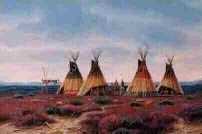By Dorreen Yellow Bird
But they weren’t Indian people at all. They weren’t even in the U.S. They were German hobbyists, Hans explained—German citizens, in Germany, who are so drawn to Indian culture that they’ve adopted parts of it as their own.
The word “parts” is key, because the hobbyists don’t claim to live like Indians today. They live what they’ve seen in movies and read in books about Indian people—that is, Indian life in the early 1800s.
Thus, the hobbyists say, they’re the “real Indians” because they know Indian culture better than American Indians do.
Those Indians from the 1800s were warriors who fought great battles and were mystical. Many people don’t see Indians today as the fighting warriors of yesteryear; instead, perhaps they see a defeated people who don’t deserve respect.
For me, these German hobbyists (and others who see only the Indians of old) have missed who we are. It isn’t our beadwork or what we wear; it’s our spirit that makes us Indian. That’s what has let us survive the unimaginable disruption to our way of life.
The hobby of being Indian
German knows more than Zuni
A typical German "Indian"?
Why Germans love Indians
Germans pretend to be Indians
These German wannabes are living the stereotypes that most Americans only believe. In any case, we can see how their stereotypical thinking plays out. Only stereotypical Plains Indians of the past are real. Therefore, today's Indians aren't real.
Therefore, we have no reason to uphold their sovereignty. Or obey the legal treaties we signed. Or fund the services we agreed to provide in exchange for their land. Or accept their right to open casinos.
All these things are related to the constant stereotyping of Natives in the media. Which is why smart Natives don't ignore this issue. Why they devote some of their energy to it along with more obvious problems such as the economy, healthcare, and crime.


No comments:
Post a Comment